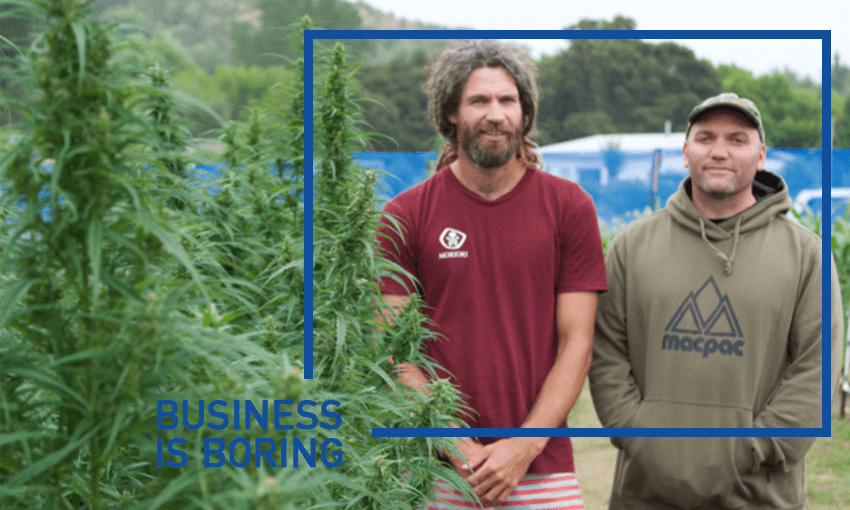Business is Boring is a weekly podcast series presented by The Spinoff in association with Callaghan Innovation. Host Simon Pound speaks with innovators and commentators focused on the future of New Zealand, with the interview available as both audio and a transcribed excerpt. This week Simon talks to Manu Caddie, founder and CEO of Hikurangi Cannabis Company.
Last year a medicinal cannabis producer called Hikurangi Cannabis Company came out of seemingly nowhere and broke the internet, crashing PledgeMe’s servers as it became the fastest local company to crowdfund into the millions – attracting 2 million-odd in pledges in less than ten minutes.
But as with most overnight successes it came on the back of years of work. It’s a long journey to change an illegal activity to a legal one. Locals from the Ruatoria area and around Ngāti Porou and the East Coast, of which Hikurangi is a significant maunga to local iwi, were given first dibs and invested ahead of the public raise. And the company – which has inked deals overseas that could stretch into the hundreds of millions of dollars – has gained first low THC and recently higher THC trial and growth rights.
And all of this without compromising on the aim of creating jobs for people who have fallen foul of the cannabis prohibition laws. While other companies have gone with a very medical-type branded approach, Hikurangi proudly showed their dreadlocked and rasta-hatted workers. This is about honesty, integrity and most importantly actually following through. The 20-plus local jobs and big milestones hit have made Hikurangi a leader in the industry, a founding member of the legal-cannabis industry council, and a beacon to many companies looking to take a community-led approach to the industry.
To talk the journey, where we are and where we go from here, founder/CEO Manu Caddie joins us now
Either download this episode (right click and save), have a listen below or via Spotify, subscribe through iTunes (RSS feed) or read on for a transcribed excerpt.
The flipside to the excitement to having $2 million of crowdfunding equity from local people is that weight of responsibility. It’s a significant investment for people and there is a lot of hope riding on it, especially in an industry like this where there’s so much media hype around it. How do you navigate all of that?
Yeah it is a big challenge and some of our people are our harshest critics who certainly have high expectations that we have raised in the process of raising the funds and of sharing the journey the community, so that is a responsibility we take super seriously. You know, every time I take a taxi and spend $50 that’s one nana – I can remember them giving me that $50 and their hopes are in those funds – and I’ve just blown it in five minutes. But those are the things that keep us grounded.
We have a staff member who is dedicated to those relationships with the community and the communication is happening regularly – [it’s about] maintaining the confidence of the community and addressing concerns when they are raised. We’ve had a hemp growing course for three years now, in partnership with the local polytech EIT and that’s been super popular around the country. Hundreds and hundreds of people have applied for it but we’ve tried to keep it for just the locals. Those people that are coming through that course are expecting jobs in the cannabis industry but we need to ensure that the jobs are coming, and part of that is laying a really solid foundation to build on. So the jobs may not be coming as quickly as people have hoped. Part of that is the constraint of the regulations and how quickly that can move and part of it is setting up a new company and developing medical products is a complex and time-consuming process. But we are moving as quickly as we can and we have 20-something jobs at the moment and are expected to increase that significantly in the next year.
Although the crowdfunding makes the headlines, that must be a small drop in the bucket of the amount of investment that is required to start a new industry, turn a crop into bio-actives, build infrastructure in an area where there weren’t bio-actives being produced from crops. What’s involved with that?
Yeah certainly, we were pretty optimistic with what we thought we could do with a few million dollars but it turns out we need a few million more, so there will be another opportunity for people that are wanting to join the journey in a few months time. But yeah we have technical infrastructure challenges and at this stage it’s looking difficult to build a manufacturing facility close to Ruatoria.


